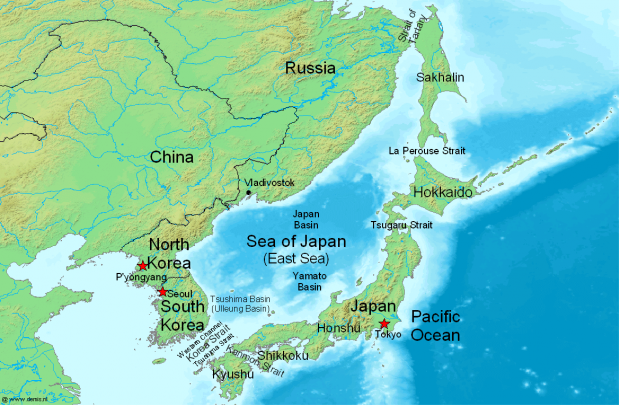
S. Korea warns of ‘corresponding measures’ against Japan’s export curbs
South Korea’s finance minister warned Thursday of “corresponding measures” against Japan’s move restricting key supplies for the nation’s semiconductor and display industries, in a major escalation of a long-simmering row over compensation for wartime forced labor. The diplomatic conflict between South Korea and Japan, which have close economic ties despite strains over history and territory, showed signs of moving toward an economic front as Tokyo implemented export restrictions against Seoul on high-tech materials vital for the production of semiconductors and display panels.
South Korea has said it will file a complaint with the World Trade Organization (WTO) to resolve the matter, but Finance Minister Hong Nam-ki said earlier in the day that the Korean government will “consider various corresponding measures” unless Japan withdraws export curbs. “We believe that the Japanese move is a clear act of economic retaliation,” Hong said in an interview with local radio station CBS, adding that the Japanese move would have an adverse impact on both countries.
“If the problem is not settled, surely (South Korea) needs to ask the WTO to make a judgment,” Hong added. “But as it takes a long time for the WTO to deliver a verdict, it cannot be the only solution.” Although Hong didn’t elaborate on what such countermeasures would be, he said South Korea will take other necessary measures under domestic and international rules as well.
Trade Minister Yoo Myung-hee echoed the view, saying that Japan’s decision goes against the global efforts to seek a free, fair and predictable free trade environment as proposed at the Group of 20 summit in Osaka last week. “The South Korean government strongly demands Japan to remove the decision to expand regulations on exports, as the move contradicts Tokyo’s previous claims and threatens the growth of the global economy,” Yoo said during a meeting with relevant government officials to cope with the Japanese export curbs.
Yoo emphasized the Japanese move violates global agreements, such as the Wassenaar Arrangement, which stipulates that export control on conventional arms and dual-use goods should “not be directed against any state or group of states” and “not impede bona fide civil transactions.” Yoo also stressed that the article 11 of the General Agreement on Tariffs and Trade (GATT) bans regulations on export volumes unless the products have a serious impact on national security.
Starting Thursday, Japanese companies need to apply for approval for each contract to export three materials to South Korean clients, including major brands such as Samsung, LG and SK. The three materials are fluorine polyimide, resist and etching gas. Fluorine polyimide is used to make flexible organic light-emitting diode displays; resist is a thin layer used to transfer a circuit pattern to a semiconductor substrate; and etching gas is needed in the semiconductor fabrication process.
South Korea was earlier granted faster export processing for items that Tokyo claims to be related to national security. Without the favor previously provided by Japan, industry watchers said it may take around 90 days for Japanese firms to ship the materials to South Korea. The presidential office, Cheong Wa Dae, confirmed that its senior officials had a series of consultations with Samsung Electronics Co. over Japan’s export curbs.
Kim Hyun-chong, deputy chief of the presidential National Security Office, met with Kim Ki-nam, a Samsung vice chairman leading its global semiconductor business sector, earlier this week. Ostensibly, Cheong Wa Dae has responded cautiously to Japan’s move as it seeks forward-looking bilateral relations, separate from historical rifts. However, Cheong Wa Dae officials have been in informal contact with related businesses to discuss how to cope with the matter. On Wednesday, South Korea also said it is carrying out a feasibility study on investing 1 trillion won (US$856 million) annually to carry out research on materials, parts and equipment for the chip industry to eventually ease its dependency of Japan in the areas. Tokyo officially claims that the restriction is based on safety reasons.
The Japanese government, however, also says trust between the two countries has been significantly harmed, indicating the move came as retaliation against a South Korean court’s decision to make Japanese firms provide compensation for their wartime forced labor. In October, the court ruled that Nippon Steel & Sumitomo Metal Corp., a Japanese steelmaker now known as Nippon Steel Corp., must compensate four South Koreans for wartime forced labor and unpaid work. The Korean Peninsula was under Japan’s colonial rule from 1910-45. The Japanese government then strongly condemned the verdict, claiming that the compensation issue was fully settled in the 1965 bilateral accord on normalizing the countries’ diplomatic ties.
President Moon Jae-in has said, however, that individual rights to damage claims were not terminated under the pact between the two countries. Experts, meanwhile, said that once the complaint is filed at the WTO, the dispute is expected to continue for a long period considering that South Korea and Japan are closely connected in the semiconductor and information technology industries.
South Korea, whose main export products include semiconductors and smartphones, relied on Japan for more than 90 percent of its supplies of resist and fluorine polyimide and for 44 percent of its etching gas over the January-May period, according to the Korea International Trade Association. “The government will take various scenarios into consideration, and assess the short- and long-term impacts on our industries,” Yoo said. “We plan to announce a countermeasure in the near future to diversify import sources of core materials, parts, and equipment.”
(Yonhap)



